The views expressed in this post are those of the author and not necessarily those of Open Nuclear Network or any other agency, institution or partner.
Russia's envoy (deputy minister of foreign affairs) Alexander Losyukov, South Korea's envoy Chun Yung-woo, North Korea's Kim Gye Gwan, China's Vice-Minister of Foreign Affairs Wu Dawei, US envoy Christopher Hill, and Japan's envoy Kenichiro Sasae join hands for a group photo after Wu Dawei delivered a statement for the press during the six-nation talks aimed at bringing about the disarmament of nuclear weapons in North Korea, on 30 September 2007 in Beijing, China. (Photo by Andy Wong/Pool/Getty Images)
* The article was originally published on ONN's Datayo platform.
Open Nuclear Network (ONN) is currently in the process of compiling a network of trusted third parties known as the ONN Engagement Network. As former officials from high-level diplomatic and military positions around the globe, they will be provided with data-driven analysis from ONN to utilize in nuclear de-escalation efforts in their respective countries. From South Korea, former Chief Negotiator to Six Party Talks Ambassador Chun Yung-woo is one of the members.
Based on an hour-long conversation with the former high-level official, this two-part analysis sheds light on what goes on behind closed doors when negotiating with North Korea. Part one lays out some of Chun's experiences as the South's top nuclear diplomat in interpreting the North’s messages to interested parties. Part two will cover his thoughts on the basic minimum conditions for a meaningful resumption of disarmament talks.
Decoding Pyongyang and Its Messages
Ambassador Chun Yung-woo, 68, is a five-time (by rounds) Chief Negotiator for South Korea at the Six Party Talks. Widely considered centre-right, he served between 2006 and 2008 under the liberal President Roh Moo-hyun and briefly under the conservative President Lee Myung-bak later.
The rising tensions on the Korea Peninsula seen in the recent years, Chun says, is a byproduct of the South Korean Blue House's lack of expertise in understanding Pyongyang; and specifically its failure to understand the significance of the Yongbyon Nuclear Scientific Research Center as the North's bargaining chip in talks with the United States.
"In this administration, there are not many advisors to President [Moon Jae-in] who know the substance of the [Korean Peninsula's] nuclear issue," [1] Chun remarked in a video interview with ONN. He believes Pyongyang officials likely put less than 20 percent of its entire nuclear programme's value on Yongbyon.
"There isn’t an objective standard on evaluating North Korea's nuclear assets. From a common-sense point of view, the value of [a country's nuclear programme] is decided on its volume and proximity to deliverable nuclear arsenals," [2] Chun explained. "In other words, in descending order of importance, North Korea's most valuable assets are: nuclear warheads, weapons-usable fissile material such as plutonium or highly enriched uranium (HEU) and fissile material producing facilities including enrichment plants, reactors and reprocessing facilities." [3]
Chun elaborated, "Hidden facilities are more valuable to North Korea than the ones that have already been made public. If we assume the country's fissile material producing facilities account for half of its entire nuclear assets and if the Yongbyon complex houses half of such facilities, the value [of the complex itself] would account for about 20 percent of the total." [4]
South Korean and American experts who have first-hand experience in dealing with the North's nuclear programme have expressed similar views. South Korea's former Vice Minister of Foreign Affairs and Trade Kim Sung-han told Reuters last year that "Dismantling Yongbyon might slow the production of plutonium and highly enriched uranium, but would not reduce the current stockpile of material." [5]
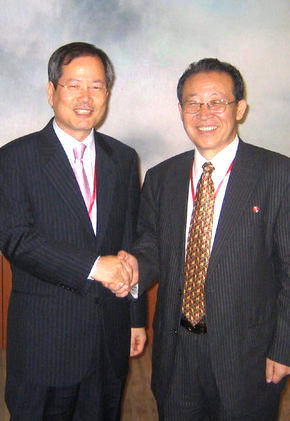
Chun and his North Korean counterpart, First Vice Minister of the Ministry of Foreign Affairs Kim Kye Gwan, shake hands prior to bilateral talks on 18 July 2007. Source: South Korea's Ministry of Foreign Affairs
Allies Apart in Valuation
"In negotiations, the value [of an offer] is calculated based not on one's own evaluation but the counterpart's. That is how [the North Koreans] could be overly hopeful," [6] Chun explained. He was referring to the short-lived summit meeting between North Korea and the US held in Hanoi, Vietnam last year.
In short, Chun believes South Korea has told its northern neighbour that giving up Yongbyon alone would be enough to receive desired sanctions relief from the US and that such was an ill-advised recommendation. He added the approach stems from not being able to accurately set its value.
North Korea Nukes at Present
Citing a US intelligence analysis, a Washington Post article reported in August 2017 that North Korea has successfully produced "a miniaturized nuclear warhead that can fit inside its missiles." The confidential analysis by the Defense Intelligence Agency follows another intelligence assessment on North Korea's atomic arsenal. The article reports the US estimates that North Korean leader Kim Jong Un controls up to 60 nuclear weapons; while independent experts on average estimate a much smaller number.
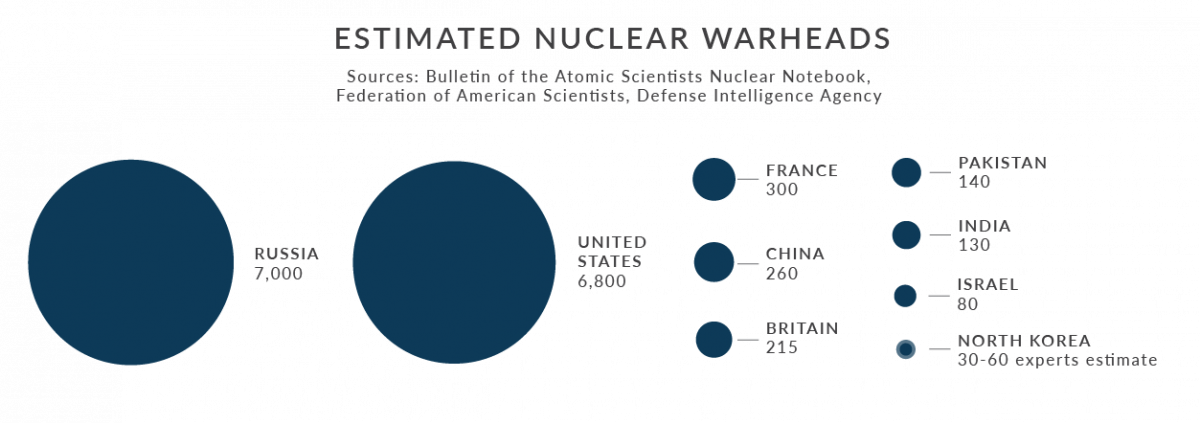
Image: One Earth Future
So even if Pyongyang dismantles the Yongbyon complex, it is likely that North Korea already has enough material to meet a conservative estimate of 30-60 nuclear warheads. Chun estimates that utilizing facilities outside of Yongbyon for 3-4 years would "yield enough nuclear material for the North to create some 20 more [warheads]." [7]
Intelligence Sharing within South Korean Government
Putting such a high premium on the value of Yongbyon in the context of negotiations with North Korea is nothing new among the South's left-leaning politicians. "Much like now, President Roh's circle was not filled with people who get the nuclear issues. Some have even relayed factually-wrong information to him," [8] recalled the policy veteran.
Back in the summer of 2002, Washington was confident Islamabad had transferred centrifuges and materials needed for a pilot uranium enrichment programme to North Korea and confronted Pyongyang officials. On 16 October of that year, the State Department disclosed the below press release:
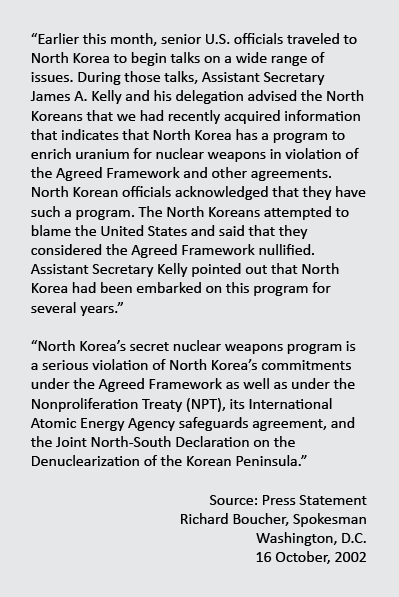
Image: One Earth Future. Source: US Department of State
Washington's realization of Pyongyang's suspected uranium enrichment programme is laid out in a prepared statement by James Kelly, Assistant Secretary of State for East Asian and Pacific Affairs, to the Senate Foreign Relations Committee titled "Dealing with North Korea's Nuclear Programs" on 15 July 2004.
"There were some people around then-President Kim Dae-jung who believed in the conspiracy that the US broke away from the Agreed Framework and intentionally tampered with evidence. President Roh Moo-hyun had believed in this scenario at the beginning [of his presidency]," [9] said Chun in one of the latest videos published on his namesake "Chun Yung-woo TV" YouTube channel. The historic agreement was signed on 21 October 1994 between Pyongyang and Washington.
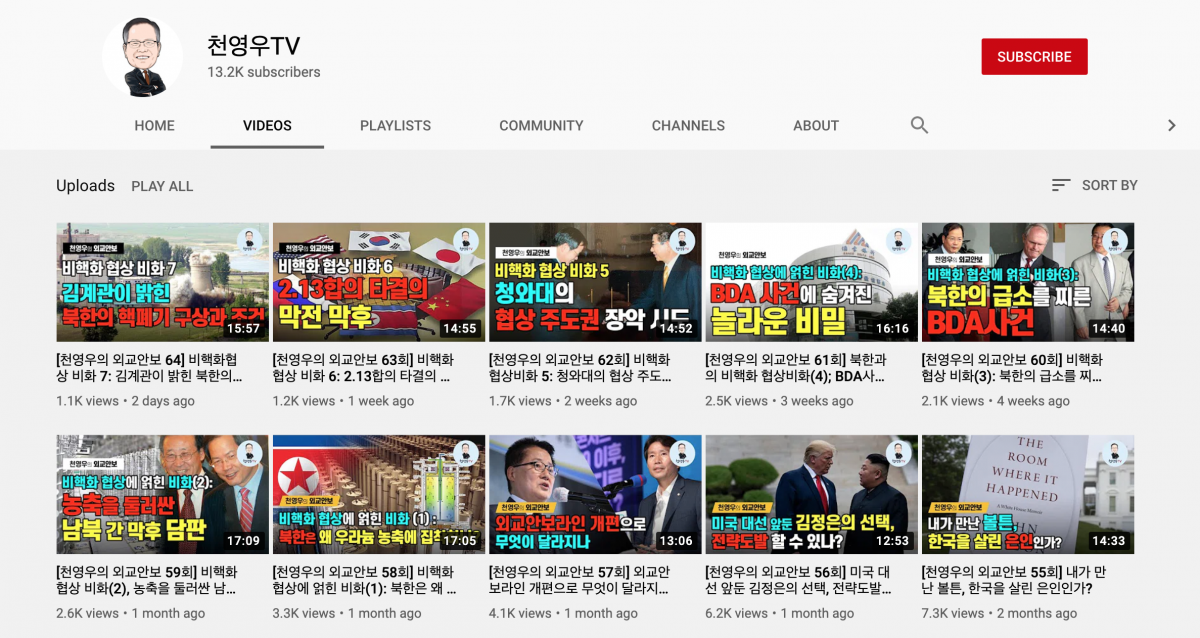
Image: Chun Yung-woo TV YouTube Channel
In the same video, Chun shared what transpired on the evening of his appointment as the Chief Negotiator on 21 February 2006.
When invited to a small and discreet dinner at the presidential residence, his intention as a newly appointed Chief Negotiator was to stay low and feel the air. That is, until he realized President Roh believed in the same conspiracy theory.
Startled by the realization, Chun spoke up in front of the Blue House staff. "I presumptuously went ahead and described North Korea's history of and truth about its pursuit of a uranium enrichment programme in detail. I explained why it is necessary to identify it," [10] he recalled.
To Roh, Chun emphasized that if and when the South Korean government considers the dismantling of the Yongbyon complex as a near complete denuclearisation of the Korean Peninsula, it will not be possible for Seoul to avoid criticism by the international community for being duped by Pyongyang.
Then-Blue House staff unanimously challenged Chun's view of North Korea's economic conditions saying it was not conducive to development of a uranium enrichment programme, and arguing that the North could not provide enough electric power.
"I explained that consistent rather than a high volume of electricity is required to enrich uranium with centrifuges. I countered their arguments by saying there is no issue with North Korea operating a factory capable of enriching a few thousand centrifuges with the diesel generator left by the Korean Peninsula Energy Development Organization (KEDO) at the Sinpo light water reactor site, for example." [11]
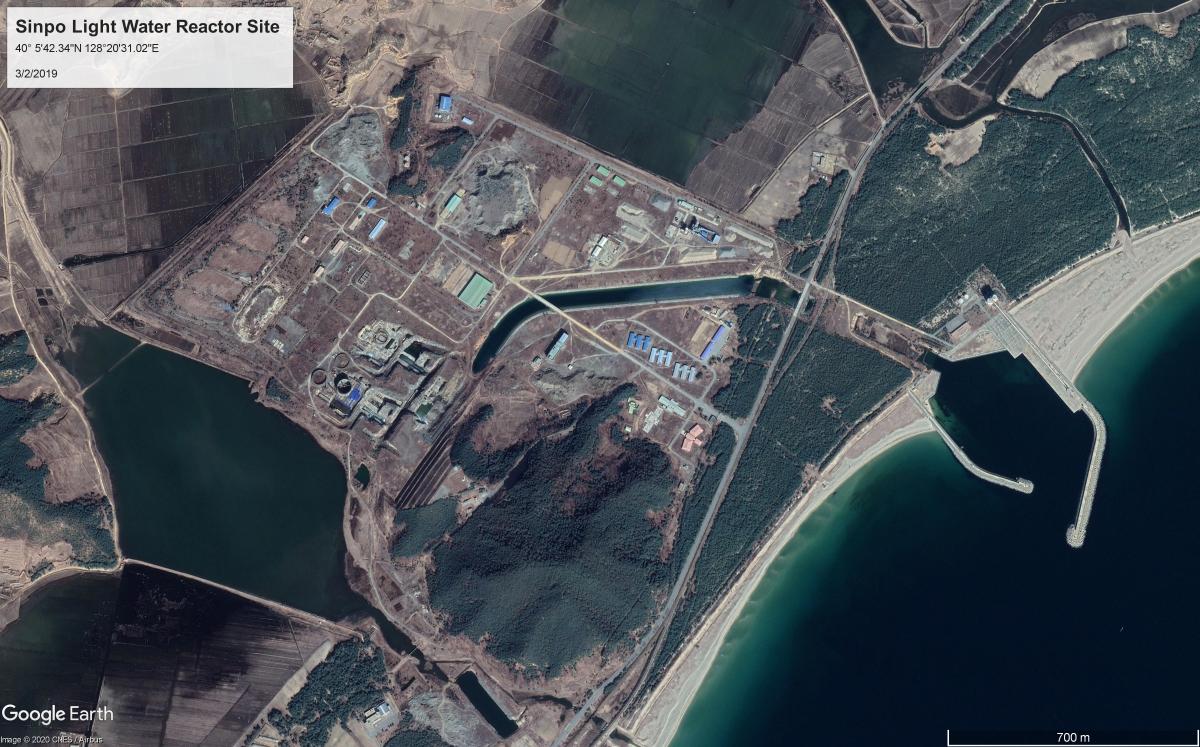
Google Earth image of Sinpo Light Water Reactor. Source: Google Earth / CNES Airbus
Chun elaborated that looking at President Roh's pensive face, it dawned on him right then and there that it may have been the president's first time hearing a counterargument to the conspiracy theory.
Active Track 1.5 Alongside Six Party Talks
The behind-the-scenes inter-Korean dialogue was active in the years 2006 and 2007, Chun explained.
"Barring special circumstances, I could always reach out and meet with my North Korean counterpart Kim Kye Gwan. While the Six Party Talks were on-going, we continued conversations on the sidelines not only in Beijing but also in Tokyo and New York," Chun said.
At the time of the last two rounds of Six Party Talks, the main concern for North Korea was the "frozen" assets at Banco Delta Asia. The US Treasury designated the Macao-based financial institution as a "primary money laundering concern" on 15 August 2005. [12]
To discuss a room for a breakthrough away from the press, Chun asked Kim to come to The Northeast Asia Cooperation Dialogue held on 10-11 April 2006 in Tokyo, Japan. It is safe to say the NEACD event was more or less a front for bilateral talks between the two Koreas.
"We arranged the accommodation so that we could stay on the same floor at the Grand Prince Hotel Akasaka. Away from the main event, Kim and I would have candid talks in my room," Chun said.
Pyongyang Neither Confirms Nor Denies Its Pursuit of Uranium Enrichment
Inside the now permanently closed hotel, Kim Kye Gwan asked for any concrete evidence of Seoul and Washington's claim about Pyongyang's pursuit of uranium enrichment. The seasoned North Korean diplomat apparently said such was needed for him to further press the matter at relevant agencies within the North Korean Ministry of Atomic Power Industry.
"This was a rather shrewd and manipulative request to test if either South Korea or the US could present evidence. Even if the US had evidence, it would not present anything that can reveal the method of intelligence gathering or the source, both of which Pyongyang could abuse to come up with an alternative way to conceal its activities." [13]
North Korea's Kim also never denied the allegations directly, only repeating that the relevant agencies have told him there is no such plan. This was likely to eschew criticism in case he had to admit the existence of a uranium enrichment program at a later date.
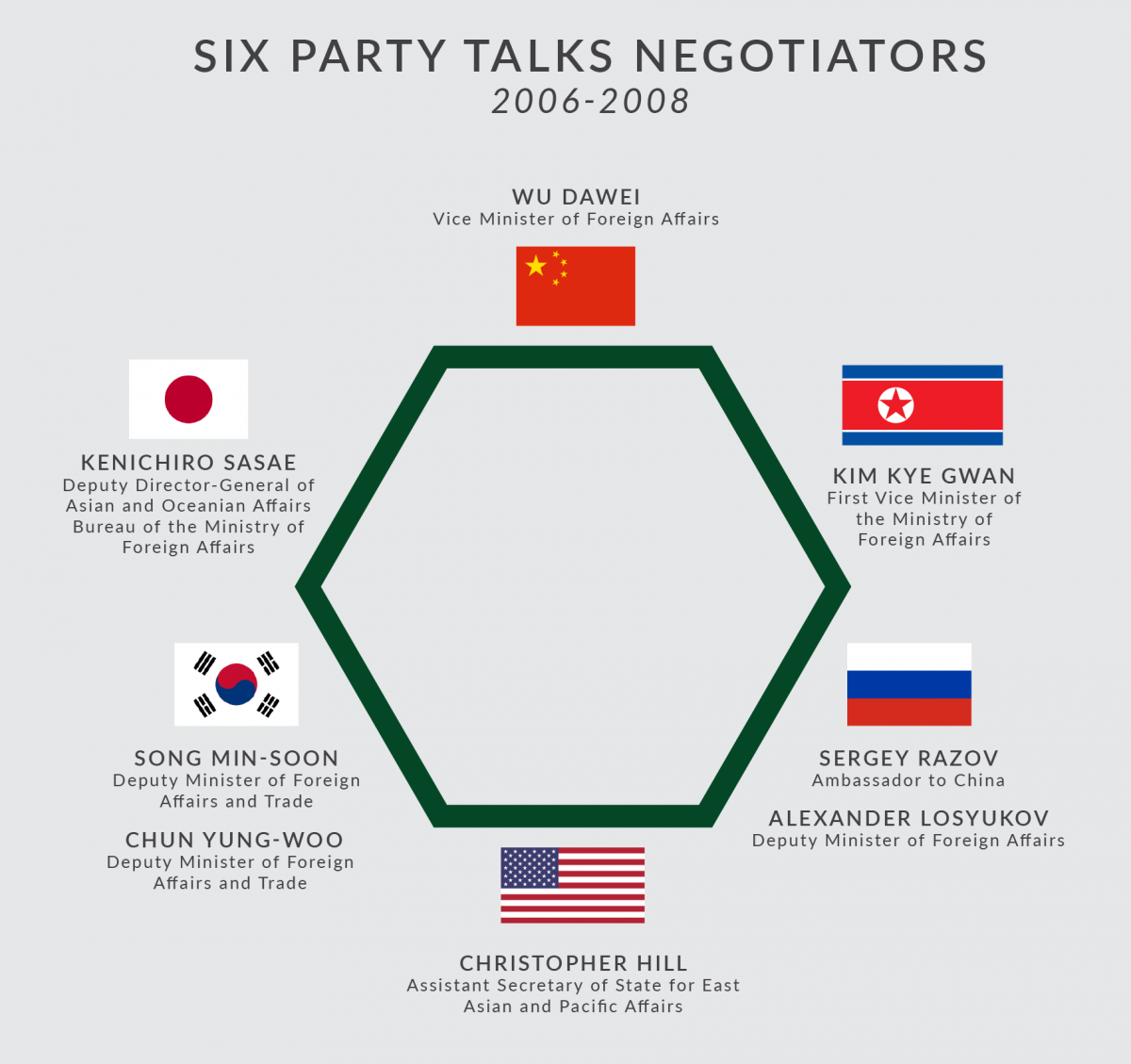
Six Party Talks seating arrangement. Image: One Earth Future
During the Six Party Talks, Chun's counterparts were the aforementioned North Korea's First Vice Minister of the Ministry of Foreign Affairs Kim Kye Gwan, the US Assistant Secretary of State for East Asian and Pacific Affairs Christopher Hill, Japan's Deputy Director-General of Asian and Oceanian Affairs Bureau of the Ministry of Foreign Affairs, China's Vice Minister of Foreign Affairs Wu Dawei and Russia's Ambassador to China Sergey Razov, who was later replaced with Deputy Minister of Foreign Affairs Alexander Losyukov.
The US Was Ready to Walk Away from Hanoi Summit
The discrepancy in each country's evaluation of the Yongbyon complex has also led to the worse-than-expected result from the Hanoi Summit. Not only that, Chun believes that the Blue House could have evaded the negative repercussions if it had listened to experts outside of the presidential house.
"I am sure the South Korean Foreign Ministry was aware that the US was ready to walk away from the meeting because the White House has already had multiple meetings on this. I was also aware of this stance from Washington," [14] Chun said, adding that he doubts the South Korean President's advisors had taken this seriously.
According to Chun's sources, the US Special Representative for North Korea Stephen Biegun considered the option to leave the summit after his visit to Pyongyang prior to arriving in Seoul to prepare for the Hanoi Summit.
Chun believes the current South Korean administration is not accurately evaluating what is at the core of the North's nuclear issue. He emphasized that it is hard to gauge the weight of each parties' priorities if one does not understand what is really at stake beyond taking the counterpart's - in this case Pyongyang's - words at face value.
The lifelong diplomat emphasized the role South Korea can and should play as a facilitator is making sure that all involved parties, especially North Korea and the US, are on the same page before and after the negotiations. In addition, he urged the Moon administration to seek counsel from experts in the South.
"President Roh double-checked even if he thought he knew. I have yet to hear about the incumbent President summoning a nuclear expert or a foreign ministry's negotiations specialist [to the Blue House] to ask relevant questions and listen," [15] Chun shared his thoughts.
As for the current climate of negotiating for the Korean Peninsula's denuclearisation, he switched to English: "Everyone is just talking past each other." [16]
Key Findings
-
Policy makers and diplomats find it difficult to assess the "value" of North Korea's nuclear weapons program in a negotiation setting. Over or undervaluation of facilities like Yongbyon or programmes like uranium enrichment can mar the negotiation process.
-
Quiet meetings between counterparts on the sidelines can help move a relationship forward and build trust.
-
Despite recent set-backs, the way forward with North Korea is to return to a phased approach in negotiation. Chun rejects the idea that North Korea would ever unilaterally disarm. Chun sees sanctions relief and securities guarantees as the way to build trust toward eventual freeze, then disarmament.
[1] English translation by the author: "이 정부에서는 대통령 주변에 어드바이스 하는 사람 중에는 핵문제 substance에 대해서 아는 사람이 많이 없어요." ONN interview of Chun Yung-woo, video conference, 27 July 2020
[2] English translation by the author: "북한의 핵 자산의 가치를 평가하는 객관적 기준은 없어요. 그러나 상식적으로 가치는 핵무기에 가까울 수록 (proximity to deliverable nuclear arsenal)높고 양(quantity)에 비례한다고 봐야죠." ONN interview of Chun Yung-woo, email, 17 August 2020
[3] English translation by the author: "가치의 순서는 핵탄두>weapons usable fissile material (Pu, HEU)>fissile material producing facility (enrichment plant, reactor+reprocessing facility 이렇게 되겠죠." ONN interview of Chun Yung-woo, e-mail, 17 August 2020
[4] English translation by the author: "Open facility보다는 숨겨둔 시설이 더 북한에게는 valuable해요. 핵물질 생산시설이 핵자산의 50%이고 영변에 핵시설의 절반이 있다면 그 가치는 전체의 20%정도로 평가할 수 있죠." ONN interview, Chun Yung-woo, email, 17 August 2020
[5] Hyonhee Shin and Josh Smith, Explainer: North Korea's Yongbyon nuclear complex takes center stage in stalled talks, Reuters, 1 March 2019
[6] English translation by the author: "자기가 스스로 보는 것 보다도 우리가 얼마로 보느냐에 따라서 협상 가치가 결정되는 것이기 때문에 그런 욕심을 낼 수 있는 것이죠." ONN interview of Chun Yung-woo, virtual, 27 July 2020
[7] English translation by author: "근대 자기들이 한 10 20개 더 만들겠다 하면 영변 시설을 버려도 영변 밖에서 3 4년 가동하면 20개 정도 더 만들 수 있는거에요." ONN interview, Chun Yung-woo, virtual, 27 July 2020
[8] English translation by author: "노무현 대통령 주변에도 지금처럼 핵을 아는 사람이 전혀 없고, 잘못된 정보를 대통령에게 입력을 시켜 놓았거든요." ONN interview, Chun Yung-woo, virtual, 27 July 2020
[9] Original: "미국이 2002년 북한의 농축프로그램 증거를 잡고 북한의 해명을 요구했을 때 미국이 제네바 합의를 깨고 의도적으로 정보를 조작했다는 음모론을 믿는 사람들이 김대중 대통령 주변에 있었습니다. 노무현 대통령도 처음에는 이 음모론을 믿고 있었습니다." See: Chun Yung-woo, [천영우의 외교안보 58회] 비핵화협상에 얽힌 비화(1): 북한은 왜 우라늄 농축에 집착하나? YouTube video titled Chun Yung-woo's Diplomacy Espiode 58, Behind the scenes at denuclearisation talks (1): Why does North Korea obsess over UEP? 19 July, 2020.
[10] Original: "그래서 제가 주제넘게 나서서 대통령께 북한이 농축프로그램을 추진해온 내력과 실체를 소상히 설명을 드리고 반드시 확실히 규명해야 하는 이유를 설명해 드렸습니다." See: Chun Yung-woo, [천영우의 외교안보 58회] 비핵화협상에 얽힌 비화(1): 북한은 왜 우라늄 농축에 집착하나? YouTube video titled Chun Yung-woo’s Diplomacy Espiode 58, Behind the scenes at denuclearisation talks (1): Why does North Korea obsess over UEP?, 19 July, 2020.
[11] English translation by author: "제가 원심분리기로 농축하는데는 품질이 일정한 전기가 필요하지 전기가 많이 들어가는 것이 아니라는 점을 설명하고 우리가 신포의 경수로 사업 현장에 남겨둔 디젤 발전기만으로도 원심 분리기 수천개 규모의 농축 공장을 가동하는데는 문제가 없다고 반박했습니다." ONN interview of Chun Yung-woo, virtual, 27 July 2020
[12] JS-2720: Treasury Designates Banco Delta Asia as Primary Money Laundering Concern under USA PATRIOT Act, the US Department of the Treasury, 15 September, 2005
[13] English translation by author: "그럴 듯 해 보이지만 한미 양국이 증거를 제시할 수 있는지는 먼저 시험해 보려는 의도가 숨겨져 있는 아주 노회하고 영악한 논리. 미국이 증거가 있어도 정보 수집의 방법이나 소스가 노출될 수 있는 증거는 내 놓을 수 없고 앞으로 더 교묘한 기만방법을 연구하는데 악용됩니다." ONN interview of Chun Yung-woo, virtual, 27 July 2020
[14] English translation by author: "미국은 이미 walk away 결정을 하고 갔잖아요. 백악관에서 이미 몇 번 회의를 하고 walk away 결정을 했다는 이야기를 그 전에 외교부는 알았을 거예요. 왜냐하면 나도 알았으니까." ONN interview, Chun Yung-woo, virtual, 27 July, 2020
[15] English translation by author: "노무현 대통령은 본인이 안다고 생각해도 확인을 했는데, 지금 대통령은 핵전문가, 외교부 핵협상 책임자를 불러서 물어보고 보고를 듣고 그런 이야기를 못 들어 봤어요." ONN interview of Chun Yung-woo, virtual, 27 July 2020
[16] ONN interview of Chun Yung-woo, virtual, 27 July 2020
